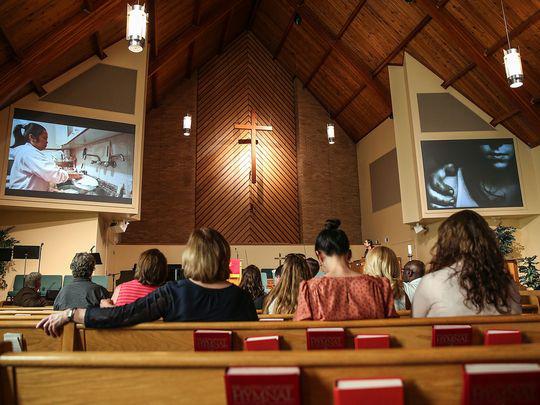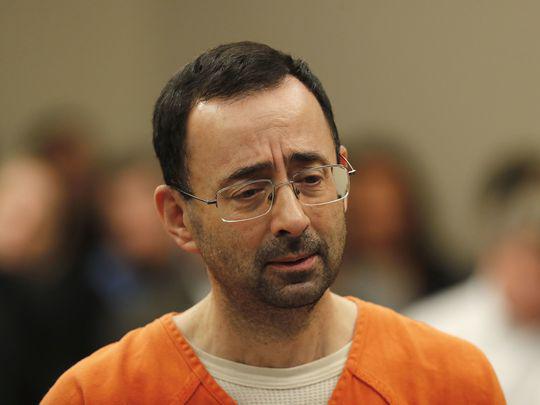|
Sex trafficking survivor says he was sold during Indianapolis 500
By Tim Swarens
[with video] One of Matt Sprague's most searing memories, he says, is of being trafficked out of hotel rooms during Indianapolis 500 race weekends Kelly Sprague knew her husband had a severe problem. Night after night, he thrashed about violently in their bed. He wandered the house aimlessly in the early morning hours. He cut himself with knives. All while he slept. Matt Sprague recalls the exhaustion he felt when he woke up each morning. He also understands now that he suffered from deepening depression, and a lifelong struggle with negative self-talk — which left him feeling worthless after even small mistakes or minor criticisms — had become harder to control. But the disturbing nighttime behavior that Kelly described? He remembered nothing about it after he woke up. So, Kelly, partly to convince Matt and partly to reassure herself that she wasn't imagining things, decided to take photos of her husband acting out during his sleep. What Matt saw in those photos prompted him finally to see a therapist at Iowa State University. And what soon emerged from the counseling sessions — secrets about the sexual abuse and commercial exploitation that Matt suffered as a child — rocked the Spragues' lives, their marriage and their family. Today, the couple is preparing to move with their children from Indiana to Florida, where Matt recently was hired as a youth pastor at a church in Vero Beach. They're hopeful that better days are ahead. A journey that left deep scarsBut the devastating journey they've been on over the past five years has left deep scars. Matt says that while in therapy, memories surfaced of a now-deceased family member sexually abusing him and selling him to other men who abused him. The abuse, which lasted for years, ended when he was 13 years old. One of Matt's most searing memories, he says, is of being trafficked out of hotel rooms during Indianapolis 500 race weekends. "I remember being in hotel rooms watching TV and men, some I knew and some I didn't know, coming to the door," Matt says as we sit in the foyer at the family's church in Columbus, Indiana. "I don't know if money, drugs or favors of some kind were exchanged. But my reward for doing what I was told was to go at the end of the weekend to the race and to pick out something at the gift shop." As the therapy progressed, Matt began to experience flashbacks in which he acted out and verbalized the abuse he'd suffered. "The memories were so vivid that it felt like it was happening right then," he says. Kelly struggled to help her husband and to shield their three children. During Matt's flashbacks, she would take the kids into another room, turn on music and read them a book. She also acknowledged what they saw and heard. 'People did bad things to him'"They needed to know that they were safe. And I told them that daddy was safe," Kelly said. "Our kids know that when daddy was young, people did bad things to him. They know that sometimes daddy doesn't know where he is or who he is. They know daddy has bad dreams." Matt's downward spiral became so severe that Kelly more than once had to call emergency services because she was afraid her husband, diagnosed with severe post-traumatic stress disorder and indications of a dissociative disorder, was about to kill himself. "I would always tell them he was a survivor of sexual abuse and trafficking and that he had PTSD," she says. "But they would always come into the house acting like he was a dangerous criminal." Eventually, Matt decided to leave his job as an associate pastor at a church in Iowa, and the family returned to Columbus in 2014. He's worked since then for the state's First Steps program, which assists at-risk children. The Spragues also have poured themselves into Matt's healing and into raising their children. They decided two years ago to go public with their story by launching a GoFundMe page to help purchase a psychiatric service dog for Matt. The dog is trained to sense and provide comfort when Matt is anxious. In January, Kelly, with Matt's consent, wrote a letter to the Indiana General Assembly seeking more and better services for trafficking victims, especially boys. After the letter was read aloud during a committee hearing, an Indianapolis TV station featured the Spragues in a story about Matt's experiences. They say they're motivated to talk about their journey by a desire to help other victims of abuse and commercial sexual exploitation and to highlight the fact that boys are trafficked far more often than is commonly known. Boys are trafficked, tooMost policy discussions and news media coverage focus almost solely on the exploitation of girls. But studies have found that boys are trafficked at significant rates. In 2016, a study commissioned by the Department of Justice, Youth Involvement in the Sex Trade, determined that boys make up about 36 percent of children caught up in the U.S. sex industry. In 2008, researchers from the John Jay School of Criminal Justice reported that boys account for about 45 percent of child trafficking victims in New York City. In reporting about child trafficking for the past two years, I've interviewed more than 60 survivors of commercial sexual exploitation. Each story is unique and abuse affects every person differently. But Matt Sprague's experience is the first I've encountered that involves suppressed memories, and as I left the initial, nearly two-hour interview I was uncertain about how or even whether to share his story. I have no doubt that Matt suffered severe trauma as a child. The details of what he shared and his behavior, as described by Matt and his wife, are consistent with what I've seen and heard from other sexual abuse and trafficking survivors. I'm also convinced that the Spragues sincerely believe that Matt's memories of what happened more than 20 years ago are accurate. But, as is often the case with childhood abuse, it's virtually impossible to prove what did or did not happen so many years ago. The idea of repressed memories has been controversial ever since it was proposed by Sigmund Freud in the late 19th century. Some skeptics dismiss virtually all claims of recovered memories. Other therapists say they've had patients make progress after recovering and then dealing with memories of childhood trauma, but they're also careful to say that the accuracy of such memories can't be verified. Yet, other therapists insist that the phenomenon of repressed memories is not only real but common. The Amercian Psychiatric Association recognizes three types of dissociative disorders, including dissociative amnesia. The majority of people who struggle with dissociative disorders, which can include memory loss about traumatic events, have suffered severe abuse in childhood. For guidance, I turned to Steven Procopio, clinical director of MaleSurvivor.org and a specialist in working with men who have suffered trauma. What pushes victims to deal with abuseProcopio said that he's assisted many survivors who blocked out at least portions of the childhood abuse they suffered. "When children are sexually abused, they may not have a clear definition of what happened to them," Procopio said. "We feel like repressed memories are a safeguard until a person is ready to deal with what happened. It's important to come up with a pace of addressing memories that is comfortable. Each person will deal with it differently." Procopio said that an outside trigger — a TV show, news story, major life event — often pushes victims to begin to deal with past abuse. One man he recently worked with finally sought help after hearing gymnasts testify during a sentencing hearing for Larry Nasser, the former U.S. Olympic team doctor now in prison for abusing scores of young women and girls. "It's really important to support the person and not to minimize what happened," Procopio said. "But also not to overreact. Fathers especially often are angry and ask, 'Why didn't you stop it? Why didn't you say something earlier?' Kids can't handle that level of vitriol." In Matt Sprague's case, he thinks several factors prompted him to recall the abuse. He was nearly 30 years old, had just had a son and was living in another state, far away from where he was exploited. He finally felt safe and settled enough to approach the darkness inside. "I remember as a child thinking that what was happening was normal. I thought every child experienced what I did," he says. "But when it stopped, everything become a blur. I tried to block it out as much as possible." Now, Matt says he gains strength from telling others about his past. He's also gained a measure of perspective about the abuse he suffered. "It's like weight is lifted off me each time I talk to someone," he says. "It's so scary how common this is. It is different for each person; my story isn't the same as someone else's. But there's a common thread that something that shouldn't have happened did happen. And now you can say here's how I'm going to handle it. It's put a lot of peace on it for me."
|
.
Any original material on these pages is copyright © BishopAccountability.org 2004. Reproduce freely with attribution.


